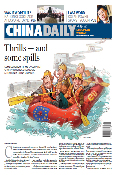Norway best, Zimbabwe worst places to live: U.N.
Updated: 2010-11-05 09:09
(Agencies)
 |
| The city of Oslo is pictured in the distance on a winters day in this February 9, 2009 file photo. [Photo/Agencies] |
Oil-rich Norway remains the best country in the world to live in, while Zimbabwe, afflicted by economic crisis and AIDS, is the least desirable, according to an annual U.N. rating released on Thursday.
The assessment came in a so-called human development index, a measure of well-being published by the U.N. Development Program for the past 20 years that combines individual economic prosperity with education levels and life expectancy.
The UNDP placed Norway, Australia and New Zealand at the top and Niger -- last year's back-marker -- the Democratic Republic of the Congo and Zimbabwe at the bottom, as Western countries again led the list while sub-Saharan African nations trailed.
Japan headed the field in life expectancy, at 83.6 years, with Afghanistan last at little more than half of that -- 44.6 years. The tiny Alpine state of Liechtenstein had by far the highest per capita annual income -- $81,011, 460 times higher than last-placed Zimbabwe on $176.
Overall, the index contained some significant changes near the top compared with last year, with the United States rising to fourth from 13th and Iceland -- hard hit by the global financial crisis -- plummeting to 17th from third.
But UNDP officials said the figures were not fully comparable due to changes in calculation methods this year.
Per capita gross national income, which includes aid and remittances, has been used instead of gross domestic product, while in education literacy levels have been replaced by average years of schooling.
Due to difficulties in obtaining the required figures from some countries, only 169 of the 192 U.N. member states were graded. Absentees included North Korea.
LONG-TERM TRENDS
Instead of year-on-year shifts, this year's report focused on what it said were upward long-term trends, assessing developments in 135 countries since 1970.
"The overall message is actually quite positive," Jeni Klugman, lead author of the report, told journalists. "What we find is that the world is much better off than it was," including a doubling of incomes in real terms over 40 years.
The report says only three countries have a lower human development index than in 1970 -- Congo, torn by conflict since the 1990s, Zambia, hit by falls in the price of copper, its main export, and Zimbabwe, where inflation reached 500 billion percent two years ago.
According to UNDP, the country to have made the most progress in the past four decades is the Gulf state of Oman, because of major health and education improvements, with China in second place due to its prodigious economic growth.
"This report shows that the gap in health and education outcomes between developed and developing countries has narrowed significantly over the past 40 years, even though the income divide, with a few notable exceptions, worsened," UNDP chief Helen Clark told a meeting to launch the index.
This year's report also drew up new indicators measuring the impact of inequality in the distribution of health, education and income, as well as of gender inequality.
On distribution it found that the country with the least inequality was the Czech Republic, while Mozambique had the most. The Netherlands had the least gender inequality, while Yemen had the most, the survey said.
Paper's Digest

Chinese jet takes on Big 2
First large commercial plane set to ride on demand for aircraft as economy grows.
Super-CPU only for domestic eyes
Specials

Chinese jet takes on Big 2
First large commercial plane set to ride on demand for aircraft as economy grows.

Gaining ground
Doing business in china for westerners has come a long way, Peter batey says.

Safeguarding environment a priority
China continues to face mounting pressure to curb environmental degradation, despite progress in reducing pollution over the last five years, the environmental protection minister warned.
